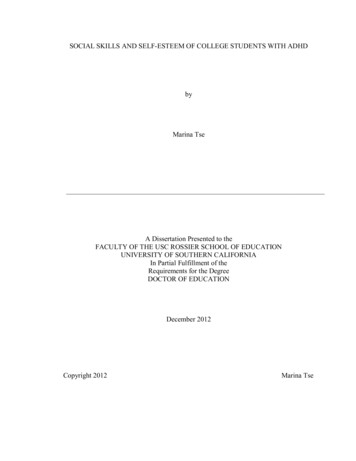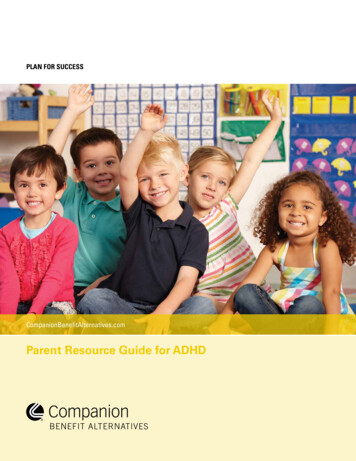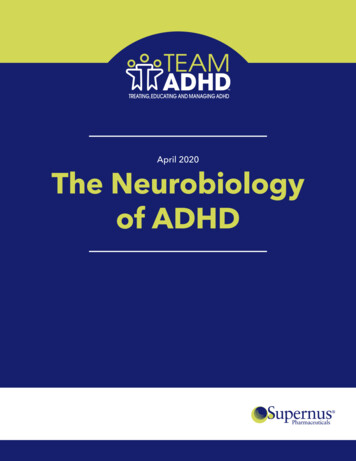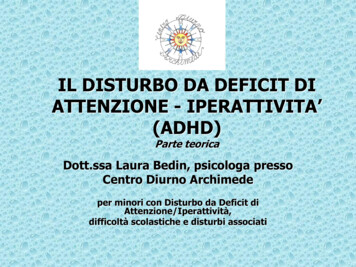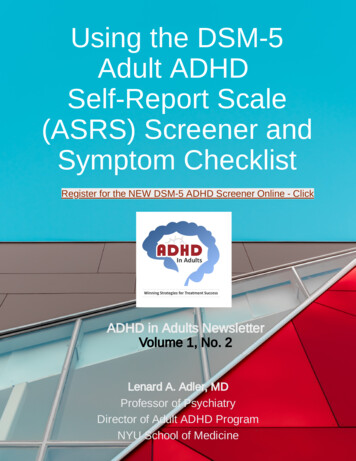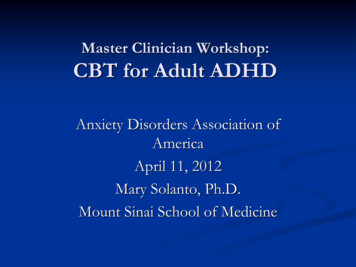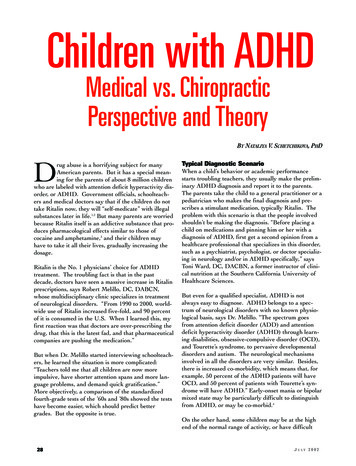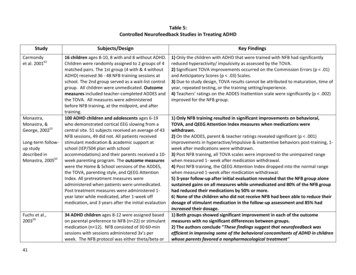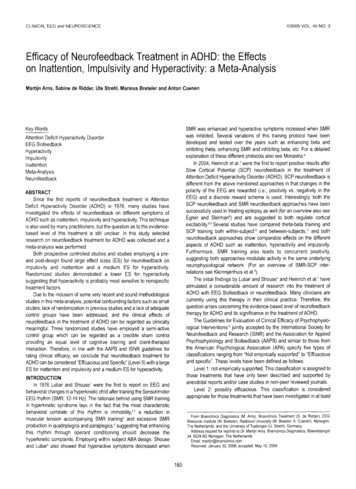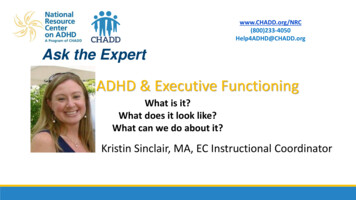
Transcription
sk the ExpertADHD & Executive FunctioningLATE, LOST AND UNPREPARED:What is it?What does it look like?What can we do about it?Kristin Sinclair, MA, EC Instructional Coordinator
A partnership between CHADD and the Centers for Disease Control and PreventionVisit us at:CHADD.org/NRCThe National Resource Center on ADHD: A Program of CHADD is the nation’s clearinghouse for evidence-based information onADHD. This Ask the Expert webcast is supported by Cooperative Agreement Number NU38DD005376 from the Centers for DiseaseControl and Prevention and does not necessarily represent the official views of the CDC. The National Resource Center on ADHD.CHADD, and the CDC do not endorse, support, represent or guarantee the accuracy of any content presented or endorse anyopinions expressed in this webcast.
What is it?Executive Functioning the brain’s CEO orchestrates resources such as memory,language, and attention to achieve a goal it is the "Conductor of the Orchestra”
DeficitsinExecutiveFunctioningDeficits in Executive Functioning Deficits in Executive Functioning (EF) undermine thechild’s ability to use internal control to regulate behavior. Therefore, the behavior of children with ADHD is moreexternally controlled than children withoutADHD. Children with AD/HD are strongly influenced by the:– Conditions of the immediate environment– Availability of immediate rewardsCHADD Parent to Parent 2008
Executive Functioning difficulties affect. Communication Pragmatics & Social Interaction Processing & Reasoning Problem Solving & Learning Memory
Communication difficulties. Disorganized conversation Unrelated thought patterns Difficulty understanding the main idea Reduced ability to use self-talk Inattentive and impulsive listening Lack of initiation
Pragmatics & Social InteractionDifficulty with the ability to take others’ perspective transitioning ability to understand nonverbal cues judgment of situations (inappropriate,impulsive, and dangerous)
Processing & ReasoningDifficulty with abstract reasoning recognizing relevant vs. irrelevant information drawing conclusions and making inferences thinking differently predicting consequences or outcomes
Problem Solving & LearningDifficulty with strategic thinking ability generate multiple solutions generalizing to other concepts learning from consequences carrying out instructions or tasks to completion recognizing failure or the need to choose other strategies
MemoryDifficulty with retaining information long enough to complete steps accomplish tasks and being on time recalling information (out of sequential order, includingverbal directions) integrating long-term memories of past experience intofuture decisions
What does it look like in school?Deficits in. working memory and recall (including memorizing words,multiplication tables, facts) activation, alertness and effort analyzing, problem solving, organizing and planning (mathword problems and writing essays) controlling emotions organization shifting and inhibiting attention
Difficulties in Reading. Planning, recalling, and using decoding strategies Reading words fluently Understanding and using information read in a sentence, passage,or longer article Making inferences or using strategies for reading comprehension
Written Language Difficulties. Motor control Planning how written information will fit on a page Writing automatically Organizing content in written material Retrieving and using ideas when writing Holding and manipulating thoughts, retrieving ideas,and executing written material
Math difficulties. Monitoring progress and self-correction whendoing calculation Maintaining an idea, organizing a strategy, andretrieving steps accurately when calculating Organizing, storing information, retrievinginformation, and executing steps when learning andapplying memorized information, such as additionfacts
Study Skills difficulties. Organizing desk, backpack Completing homework Reading a text and gleaning neededinformation Listening and gleaning needed information Turning completed homework in on time Interpreting assignments correctly Using study strategies in the classroom
Role of the Classroom Teacher Regarding Students with ADHDKnow and understand what ADHD is. Describe classroom behaviors that arelimiting a student’s access to the generalcurriculum. Employ behavioral interventionsand educational techniques tobest meet the student’s needs.8C-18CHADD Parent to Parent: 201011-2010
Rethinking ADHD From a Cognitive Perspective Executive functions refer to a set of cognitive processes thatenable us to:– Get started – make and carry out plans– Direct our attention– Focus– Organize school possessions and academic material– Manipulate information in our heads– Be able to switch from one task to another– Control our impulses and emotionsCHADD Parent to Parent : 20108C-1911-2010
1. Regulating ActionsManaging and regulating one’s actions byinhibiting impulsive behaviorsCHADD Parent to Parent: 2010Indicators of Weak EF Skills Jumps to conclusions Says things without thinking Unaware of the impact of hisbehavior on others Begins worksheet without readinginstructions Believes work is good despiteevidence to the contrary8C-2011-2010
2. Focusing, ShiftingAttention to TasksTuning in, resisting distractions,sustaining focus, shifting attentionwhen appropriateIndicators of Weak EF Skills Loses track of activities Easily distracted by environment Difficulty shifting attention when schoolsubject changes Poor reading comprehension8C-21CHADD Parent to Parent: 201011-2010
3. Getting StartedIndicators of Weak E F SkillsDifficulty: Initiating work tasksGenerating ideas and beginning workFinding the main ideaStarting work requiring mental effortOrganizing verbal output and often changingtopics mid-sentenceOrganizing, prioritizing and startingwork tasksCHADD Parent to Parent: 20108C-2211-2010
4. Accessing Working Memory and RecallIndicators of Weak E F SkillsDifficulty:Holding information in mind for the purposeof completing a taskCHADD Parent to Parent: 2010 Remembering and following verbaldirections Retrieving information from memorywhen taking tests Retaining Information in the brain tocomplete complex math problems orlengthy writing assignments Recalling what was read to be able tosummarize.8C-2311-2010
5. Organizing and Planning Schoolwork & LifeIndicators of Weak EF SkillsDifficulty:Organizing schoolwork and personal space Organizing possessions and materials Knowing, understanding, organizing andturning in school assignments Managing or pacing time Sequencing a complex task Analyzing and problem solvingPlanning and executing schoolwork andplanning for the futureCHADD Parent to Parent: 20108C-2411-2010
6. Self-MonitoringIndicators of Weak EF SkillsDifficulty:Monitoring one’s own performance andmeasuring it against some standard of what isneeded or expectedCHADD Parent to Parent: 2010 Reviewing school work to check forerrors Understanding that the rough draft isnot the final draft Persisting or following through on atask because it requires so much effort Failing to adjust behavior based onfeedback.8C-2511-2010
7. Controlling EmotionsIndicators of Weak EF SkillsDifficulty:Managing frustration and regulatingemotions Poor control of emotionsLow threshold for frustrationMay lash out when frustrated by peersEmotionally over-reacts to difficult situationsGives up easily and has excessive worry(Not in DSM-5 Criteria)CHADD Parent to Parent: 20108C-2611-2010
Executive FunctionsRegulating ActionsFocusing, ShiftingGetting StartedWorking Memory and RecallOrganizing Work & Materials/PlanningSelf-MonitoringThe 4 FOUNDATIONALPRINCIPLESfor every Lesson, Activity andInteraction Brevity Clarity Variety StructureControlling EmotionsCHADD Parent to Parent: 20108C-611-2010
Technique #1:Meet andGreet Be at the classroom door asclass begins Say “hello” with a high five,handshake, or fist bump Make a personal connectionthrough a comment orquestion8C-811-2010
Technique #2:Agendas/Checklists Instructions Assignments Lists of Eventscomponent:PRIORITIZATION!CHADD Parent to Parent: 20108C-1011-2010
Sample Agenda for a Math Lesson: Bell activity: “Meet Someone New”—Go mingle! Correct HW pg. 53, odds Lesson on dividing integers Work on HW: Blue “Let’s Divide” page—Due Thursday, 10/14 Calculation game (if time)CHADD Parent to Parent: 20108C-1111-2010
CHADD Parent to Parent: 20108C-1211-2010
Technique #3:FoldablesandGraphicOrganizersCHADD Parent to Parent: 20108C-3211-2010
Technique #4:BrainBreaksCHADD Parent to Parent: 20108C-3311-2010
CHADD Parent to Parent: 20108C-3411-2010
Technique #5:Think-PairShare Step 1:Think for 32seconds of the 5 teachingtechniques that have beenpresented. Choose onetechnique that might helpbuild a missing executiveskill in your “selectedstudent.”CHADD Parent to Parent: 2010Step 2:Pair with yourneighbor for 50 seconds.Discuss some simple stepsthat you can take toimplement this technique inyour classroom.Step 3:Sharethis informationas a class for 66seconds.8C-3511-2010
Technique #6: Timers Time Timer (www.timetimer.com)(iPad version .99-2.99 on iTunes or in App Store)one FREE pre-installed as well on the clock app Jeff Ertzberger’s Power Point Timerhttp://people.uncw.edu/ertzbergerj/ppt timers.html Play music during a break—when the song ends,students know learning will resume.CHADD Parent to Parent: 20108C-3611-2010
Color Code ClassroomInformationTechnique #7:CHADD Parent to Parent: 2010COLOR8C-3711-2010
Technique #8:ReadtotheClip8C-38CHADD Parent to Parent: 201011-2010
Technique #9: Mnemonics “Thirty days hath September ” H-O-M-E-S (the Great Lakesare Huron, Ontario, Michigan,Erie, and Superior) “Every Good Boy Does Fine”for the notes on the lines ofthe treble clef 1-800-CAT-HELP for 1-800-228-4357CHADD Parent to Parent: 20108C-3911-2010
Technique #10:Post-itNotes CHADD Parent to Parent: 2010(Okay, don’t getcarried away!)8C-4011-2010
Resources for Teaching Studentswith ADHD CHADD Educator’s Manual on ADHD: An InDepth Look from an EducationalPerspective. This is "the" manual for managingstudents with ADHD available at the online store ofNational CHADD at www.chadd.org Teaching Teens with ADD/AD/HD by Chris ZeiglerDendyCHADD Parent to Parent: 20108C-4111-2010
Resources for Teaching Studentswith ADHD (cont’d.)United States Department of Education web d/adhd-teaching-2008.pdfDownloadable Booklet titled “Teaching Children with Attention-Deficit Hyperactivity Disorder:Instructional Strategies and Practices”Foldables websites: wrhs.pasco.k12.fl.us; wik.ed.uiuc.edu; www.dinah.com21st Centrury Resources: http://learningworksforkids.com/appsMisunderstood ttention.html Understood.orgExecutive Skills in Children and Adolescents, Peg Dawson and Richard GuareNational Center for Learning DisabilitiesCenter for the Developing Child, HarvardCHADD Parent to Parent: 20108C-4211-2010
Thankyou!Kristin Sinclair Instructional CoordinatorPrograms for ExceptionalChildrenKannapolis, North Carolinakdmclear@aol.com
sk the ExpertADHD & Executive FunctioningLATE, LOST AND UNPREPARED:What is it?What does it look like?What can we do about it?Kristin Sinclair, MA, EC Instructional Coordinator
This is a presentation of the National Resource Center on ADHD.Provide feedback for the Ask the Expert webcast series!Your opinion helps evaluate and improve elp4ADHD@CHADD.org
The information provided in this episode of Ask the Expert is supported by CooperativeAgreement Number NU38DD005376 from the Centers for Disease Control and Prevention(CDC). The Ask the Expert webinars’ contents are solely the responsibility of the invitedguest Expert and do not necessarily represent the official views of CDC. Neither CHADDand the National Resource Center on ADHD, nor the CDC endorses, supports, represents orguarantees the accuracy of any material or content presented in the Ask the Expertwebinars, nor endorses any opinions expressed in any material or content of the webinars.CHADD and the National Resource Center on ADHD offer webinars for educational purposesonly; the information presented should not be regarded as medical advice or treatmentinformation.
4. Accessing Working Memory and Recall Indicators of Weak E F Skills Holding information in mind for the purpose of completing a task Difficulty: Remembering and following verbal directions Retrieving information from memory when taking tests Retaining Information in the brain to complete complex math problems or lengthy writing .

